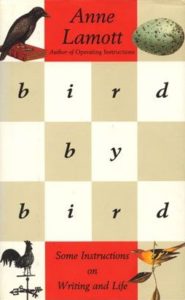 Bird by Bird: Some Instructions on Writing and Life, by Anne Lamott (Pantheon, 1994, 237 pp.)
Bird by Bird: Some Instructions on Writing and Life, by Anne Lamott (Pantheon, 1994, 237 pp.)
Writing, someone once said, is easy. Just sit down and wait for the blood to pour out of your forehead. Mark Twain said that to write, all you had to do was cross out the wrong words. This is not unlike the fellow who carved birds out of a block of wood. All you need do, he advised, is carve away all the parts that don’t look like a bird.
What does it say about writing that when you were in school, one of the worst forms of punishment was being forced to write an essay on why you were being punished? Who among us didn’t dread that thousand-word essay on “What I Did During My Summer Vacation”?
Writing—or at least writing well—is simultaneously one of the most difficult and one of the most romanticized of all occupations. Writers are either mysterious, reclusive creatures who are seldom seen (Harper Lee, J.D. Salinger) or celebrated alcoholics (F. Scott Fitzgerald, William Faulkner, Ernest Hemingway) who draw attention to themselves for their eccentricities.
 Some writers seem to need the stereotypical secluded garret—complete with exotic location—to stimulate the muse. David McCullough famously has a writing shed on Martha’s Vineyard (pictured here). Christopher Morley built his writing nook, “The Knothole,” with his own hands on his Long Island estate, and it’s preserved at Christopher Morley Park in Roslyn, NY (and pictured below). The late Carl Vipperman, UGA history professor extraordinaire, built a similar shed in his own backyard that I was privileged to see. Pinterest boards of “writing retreats” abound.
Some writers seem to need the stereotypical secluded garret—complete with exotic location—to stimulate the muse. David McCullough famously has a writing shed on Martha’s Vineyard (pictured here). Christopher Morley built his writing nook, “The Knothole,” with his own hands on his Long Island estate, and it’s preserved at Christopher Morley Park in Roslyn, NY (and pictured below). The late Carl Vipperman, UGA history professor extraordinaire, built a similar shed in his own backyard that I was privileged to see. Pinterest boards of “writing retreats” abound.
Ideal conditions still don’t always do the trick. Dick Van Dyke played television writer Rob Petrie on “The Dick Van Dyke Show,” but he never felt like a “real” writer, a theme the show explored amusingly in several episodes. In “A Farewell to Writing,” Rob’s friend Harvey Bellman completes his new novel, The Day of the Sky, and invites Rob to borrow Harvey’s mountain cabin, described as a “perfect place for a novelist to nov.” Desperate to finish his own novel—and thus be a “real writer”—Rob spends several days there alone, and of course suffers completely from writer’s block.
So if writing is so difficult and mysterious, and something that we all loathed in our school days, why does everyone seem to be a frustrated writer? Thanks to the Internet, blogs like the one you’re suffering through at this moment have proliferated, and anyone with a keyboard is a writer now.
Anne Lamott’s book helps us make sense of it all. The daughter of a writer, she de-mystifies the process and boils it down as best she can. Like finding time to read, there is no secret formula for writing. You just have to sit down and do it, day after day.
Other good advice she dispenses:
If you’re writing a novel don’t think you have to have it all figured out beforehand. She quotes E.L. Doctorow: “Writing a novel is like driving a car at night. You can only see as far as your headlights, but you can make the whole trip that way.”
“Nothing is as important as a likable narrator. Nothing holds a story together better” (Think Dr. Watson).
“You probably won’t know your characters until weeks or months after you’ve started working with them. Don’t pretend you know more about your characters then they do, because you don’t. Stay open to them. Listen. It’s that simple.”
For me, writing fiction seems immensely more difficult that writing non-fiction, but Lamott’s rules of engagement still apply: get the words down on the screen (or paper), somehow, someway, and do it every single day. Find your voice. Write now, edit later. Allow yourself to write a crappy first draft. Don’t worry about getting published, or finding an agent, or think that if you ever do see your words in print, that it will demonstrably change your life. Unless you’re Stephen King, that’s not likely to happen. As a coach famously said, if you’re not enough before the gold medal, you won’t be enough after you have it.
Write for the sheer joy of it, write to understand yourself and the life around you, write to explain yourself to your children. Listen to that inner voice, and don’t worry that you can’t see beyond the headlights.
Good advice for writers, and pretty good advice for life.


This was lovely. I almost feel inspired to write having always been too timid to think anyone would care. Your point – who cares if they do or don’t? I’ll get to it.